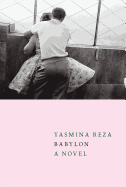
French novelist and playwright Yasmina Reza has a knack for taking a small moment and using it to blow her characters' worlds to smithereens. In plays like Art and God of Carnage, little events are the unseen first dominos to greater chaos. In Babylon, her eighth novel, small moments abound, though it's never clear quite what that first domino is.
Elizabeth, the narrator, is middle-aged and bored with her middle-class existence. Not particularly creative, she devises a dinner party for her friends. The conversation sparks an argument between her married upstairs neighbors Jean-Lino and Lydie. Jean-Lino later wakes Elizabeth and her husband in the middle of the night, revealing that he has strangled his wife and pleading with them to help remove the body. With little hesitation, Elizabeth says yes.
That might sound like the plot to a thriller or crime novel, but Reza is barely interested with the crime itself, and more with Elizabeth's and Jean-Lino's psychological states. Elizabeth frames the story, dropping back into her past every so often with details that seem to have little bearing on her predicament of how exactly to get rid of Lydie's body. Reza deftly creates a woman who can recount her past, but barely explain it, who surmises that she is unhappy but cannot say how and where she went wrong. Jean-Lino is much the same, seemingly helpless in the face of what he's accomplished. Reza doesn't craft a clear-cut narrative of the how and the why of the characters' actions, but instead reveals the swirling mess of memory and fear that drives them forward. --Noah Cruickshank, adult engagement manager, the Field Museum, Chicago, Ill.

